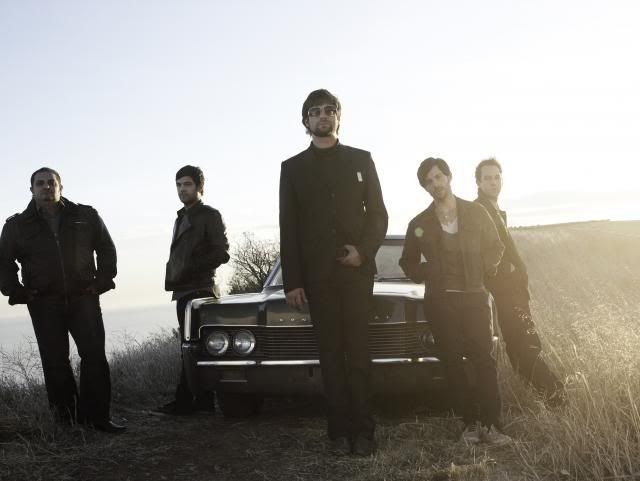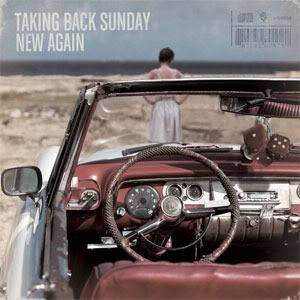 While this picture may not be recent (it's from their 2002 music video for "Keep Fishin'" off of their incredibly underrated album Maladroit), it certainly shows the fun-loving musicians that make up Weezer. Their most recent album, Raditude, dropped Tuesday (November 3rd), less than a year and a half after its predecessor, their third untitled album. First of all, what the hell kind of name is Raditude!? Well it basically means "awesomeness" or "epicality" or any other made up noun form of a word synonimical to badassery. And it was coined by none other than Rainn Wilson. The following is a track-by-track summary of Weezer's new album.
While this picture may not be recent (it's from their 2002 music video for "Keep Fishin'" off of their incredibly underrated album Maladroit), it certainly shows the fun-loving musicians that make up Weezer. Their most recent album, Raditude, dropped Tuesday (November 3rd), less than a year and a half after its predecessor, their third untitled album. First of all, what the hell kind of name is Raditude!? Well it basically means "awesomeness" or "epicality" or any other made up noun form of a word synonimical to badassery. And it was coined by none other than Rainn Wilson. The following is a track-by-track summary of Weezer's new album.The first track, "(If You're Wondering If I Want You To) I Want You To," while it should be named "(If You're Wondering If This Song Title Could Get Any Longer) I Dare You To," is the first single, and is in a very different style than previous Weezer songs. I've never before thought of describing a Weezer song as "catchy." Now I can. "I Want You To" is an infectious, fast-paced pop-rock song which was the perfect choice for the lead single. Watch out for the four-part (at least) harmony in the bridge.
"I'm Your Daddy" is track #2, and single #2. While I'm definitely not a fan of sequencing an album by singles, it works here. What's notable about this song is that this is where it really becomes evident how much Rivers Cuomo loves the word "ain't." Sure, he's said it in every album he's ever released, but in this song he sings it four times every chorus. This song also is notable for Weezer's experimentation with synthesizers. Look out for the bridge playout (2 synth parts, no guitars or bass)
With "The Girl Got Hot," Weezer continues to provide humor in the form of harmless pop/rock songs about questionable or surprising motifs.
Oh, hey Lil' Wayne. Wait what!? Okay, time for a story. This song ("Can't Stop Partying") was written a while ago (pre-Red Album), and was included on Cuomo's second Alone home recordings album. He wrote it with Jermaine Dupri, and was initially an incredibly depressing song performed by Cuomo and his acoustic guitar (with faint keys and drums). It was real. The narrator expressed his depression and sang sincerely about his problems (albeit with an ironic flair). In this version, however, the instrumentation was changed to be similar to that of a hip-hop song (there are three people playing synth parts in the live version), possibly for irony's sake... I think that the original version on the acoustic guitar is better, for connection and sincerity's sake, but I can see the appeal of this version.
For track 5, "Put Me Back Together," Cuomo collaborated with Nick Wheeler and Tyson Ritter of The All-American Rejects. It's a really well done alt-rock song and an overall successful collaboration, in my opinion. It doesn't necessarily sound just like AAR, but it's clearly not a typical Weezer song. This song also revisits some of the lyrical themes that were so present in Weezer's earlier work (the idea that the narrator will never be enough for anyone).
"Trippin' Down the Freeway" starts right in with an awesome vocal melody / guitar riff combination. The lyrics are fairly nonsensical, as he talks about Shirley Appleby (who...?) and Kevin Green (some dude this girl apparently went out with). He does however create clever enumeration within the choruses, as he first sings about '08 and '09, then about '09 and "oh-ten," followed by "oh-ten and oh-eleven" (who knew what to call those anyway?) and rhymes 3 different ways of saying "forever" with that. All in all, another reliable performance of theirs.
Okay, let's start this one by talking about the Indian rock fusion that occurs in "Love is the Answer". You might think it's gimmicky or lame, or whatever. Think about it this way... remember the Beatles? They started incorporating elements of Indian music into their songs, and I'm sure initially people thought they were crazy... but it was in the midst of Beatlemania, so those people who were already fans just ate it up, and those who weren't took some drugs and then decided it was awesome. The reason this song may not work in general is that as a standalone song (without the Indian stuff), it's just a very average pop song with an incredibly clichéed message. Don't believe me? Listen to Sugar Ray's version. Released first, and featuring Rivers Cuomo, this should have been a good indicator that this song should either have been abandoned (as it was in 2005 when determining a tracklisting for Make Believe) or drastically changed. Hence the Indian stuff. Despite all of this, I still think that the elements of Indian music implemented and the use of a featured vocalist singing in Hindi is innovative and cool.
Sadly, I have to say that "Let It All Hang Out" is a poor attempt at recapturing the sound and feel of 2002's Maladroit. That album draws strong metal influences while still being alternative rock, and it is very obviously the most underrated album of Weezer's. "Let It All Hang Out" is a much poppier version of the kind of song you would find on Maladroit. A very simply written song, it comes off as fairly boring and repetitive, and it doesn't live up to what we've come to expect from Weezer.
"In the Mall" makes up for it. Written by drummer Patrick Wilson, "In the Mall" is a face pounding rock song with strong instrumentals and harmonies. Sure, the lyrics don't really make that much sense, but the last time Weezer tried to make sense resulted in an album that was never released. Also, look out for the guitar solo (one of the few on this album).
The standard edition album closer, "I Don't Want to Let You Go" was the perfect choice as a closer as far as sequencing is concerned. This song is a finale song. Reminiscent of "The Angel and the One" in mood, Raditude's closer is faster-paced. Both songs, however, are extremely emotionally charged. Previously released on Cuomo's Alone II (like "Can't Stop Partying"), "I Don't Want to Let You Go" was a good choice from the back catalogue. There really isn't much to say about this song other than that. I love this song. If you become disenchanted with the second half of the album (which is understandable), don't dismiss this song.
______________________________
______________________________
______________________________
On a whole, I love this album. I'm slightly biased because Weezer is one of my top 10 favorite bands of all time, but I also know what I'm talking about because of it. This album is very different from previous Weezer albums, mainly in its inception. Hot off of their historic Hootenanny Tour (to which fans were encouraged to bring instruments and play along), it seems the band enjoys playing music with people besides themselves. This is the first time that people who weren't members of Weezer have contributed to the writing of tracks that end up on a Weezer album. Before 2008's Weezer, the band had never even had anyone else sing lead on a song. Raditude features Lil Wayne. "Trippin' Down the Freeway" and "I Don't Want to Let You Go" are the only songs solely written by Cuomo. Of the Weezer catalog pre-Raditude, nearly every song boasts that credit. One could speculate that this is the reason that Weezer's seventh album came out a mere 17 months after their sixth, but then how could we explain Maladroit's release exactly one year after 2001's Weezer? My guess is Weezer is just awesome and does whatever the heck they want. They said after the Red Album came out that they were feeling super productive and would probably head back into the studio soon to lay down some more new material, but then they said they weren't going to anymore. But then they did. Weezer is branching out and experimenting with collaboration, and it seems to be working to their benefit. Another interesting twist that has resulted from this album is their live show. Patrick Wilson has moved from drums to guitar/keyboards, and Josh Freese (A Perfect Circle, Nine Inch Nails, Guns and Roses, The Offspring) has taken over drum duties for apparently 90% of their show (and the recordings of "I'm Your Daddy," "The Girl Got Hot," and "Let It All Hang Out"), but will not officially join the band, as Wilson continues to be Weezer's permanent drummer and can be seen on the drums in the music video for "...I Want You To" even though he doesn't play the drums when they play the song live.
 Raditude is available in seven formats.
Raditude is available in seven formats.Standard Edition: the 10 track album as a compact disc or as an mp3 download.
Deluxe Edition: the complete 10 track album, and the four bonus tracks ("Get Me Some," "Run Over By a Truck," "The Prettiest Girl in the Whole World," and "The Underdogs") as a set of two compact discs or as an mp3 download.
iTunes Pass: the complete 10 track album, the four bonus tracks from the deluxe edition, and several other bonus tracks and videos (originally released one per week leading up to the album's release) not available anywhere else.
Standard CD + Blue Snuggie: If you haven't heard, Weezer is the first band to have their own Snuggie. This version includes the complete 10 track album and your very own Weezer Snuggie.
Just the Facts Edition: the Raditude Deluxe Edition CD and a 144 page photo book of exclusive live and studio photos (includes an immediate download of digital photos as well)
"Snuggie Flashback" Package: the Raditude Deluxe Edition CD, the photo book, an exclusive tie-dye Weezer Snuggie, and a black T-shirt featuring Sidney the Dog (from the cover).
"...But Not the Kitchen Sink" Package: the Raditude Deluxe Edition CD, the Red Album Deluxe Edition Vinyl, the photo book, the exclusive tie-dye print Weezer Snuggie, the exclusive Raditude T-shirt, and a limited Raditude cover art print (each of which is hand-numbered).
"Snuggie Flashback" Package: the Raditude Deluxe Edition CD, the photo book, an exclusive tie-dye Weezer Snuggie, and a black T-shirt featuring Sidney the Dog (from the cover).
"...But Not the Kitchen Sink" Package: the Raditude Deluxe Edition CD, the Red Album Deluxe Edition Vinyl, the photo book, the exclusive tie-dye print Weezer Snuggie, the exclusive Raditude T-shirt, and a limited Raditude cover art print (each of which is hand-numbered).
To buy Raditude, visit http://www.weezer.com/raditude/.

Be sure to view Weezer's most recent performance for Sessions@AOL with guests Sara Bareilles, Kenny G, and Chamillionaire.



